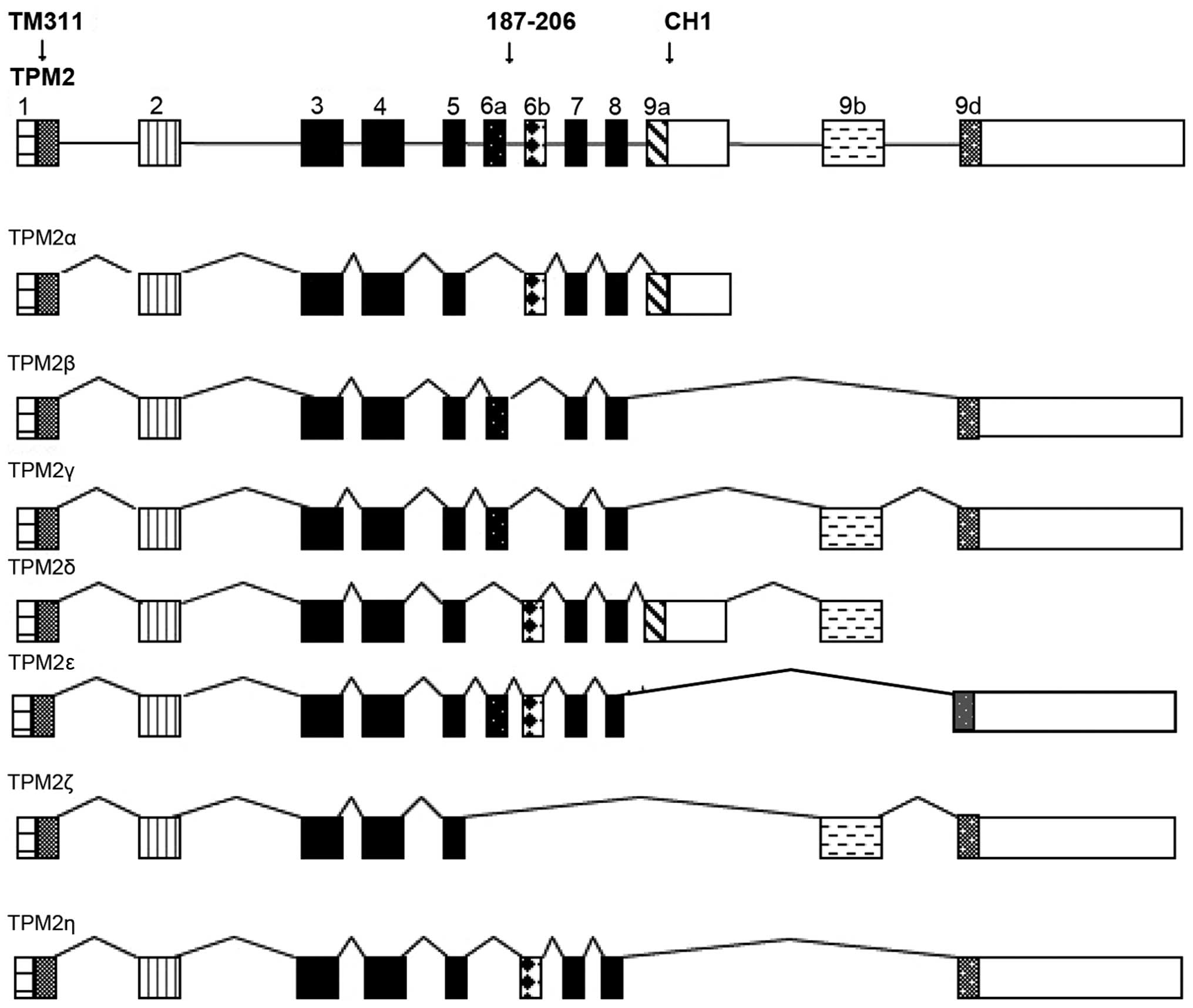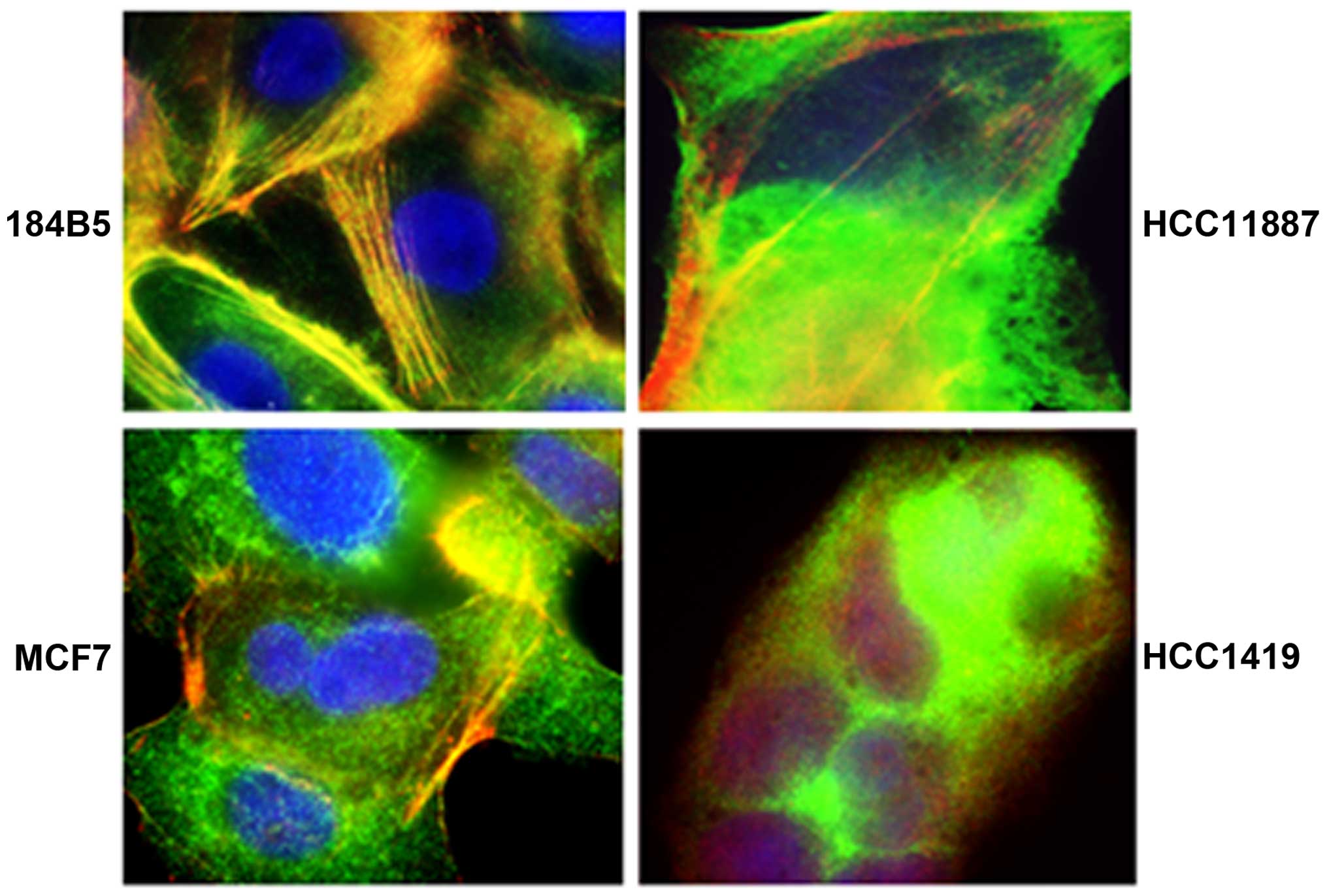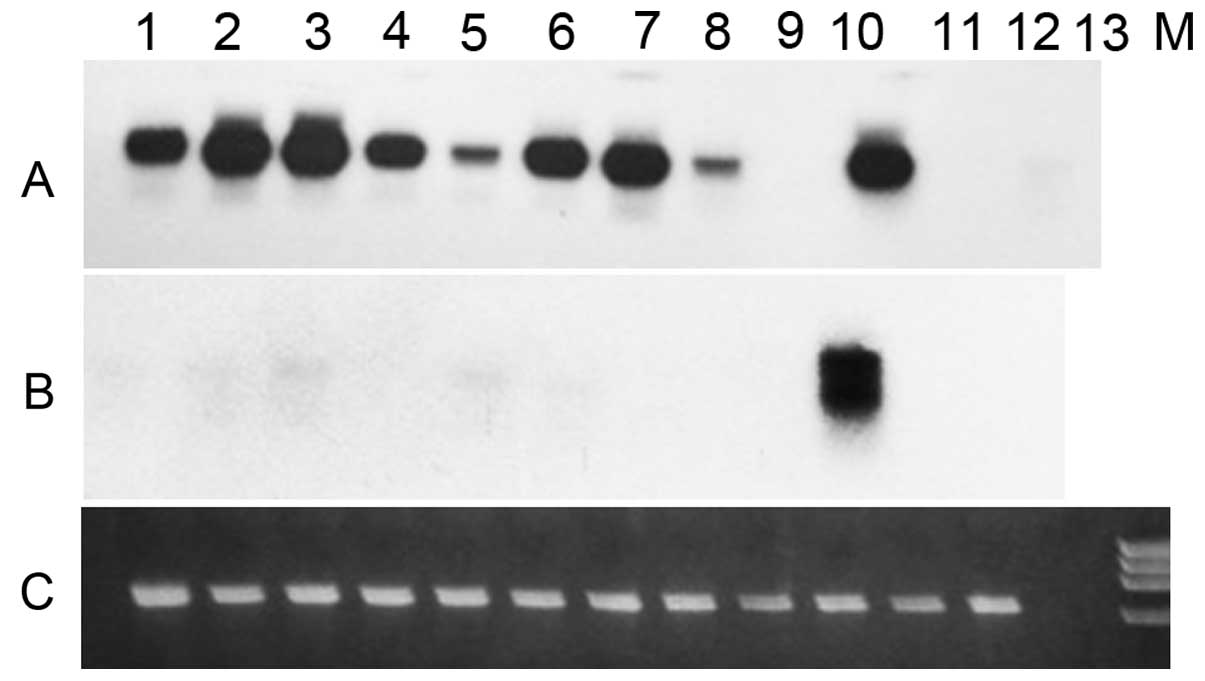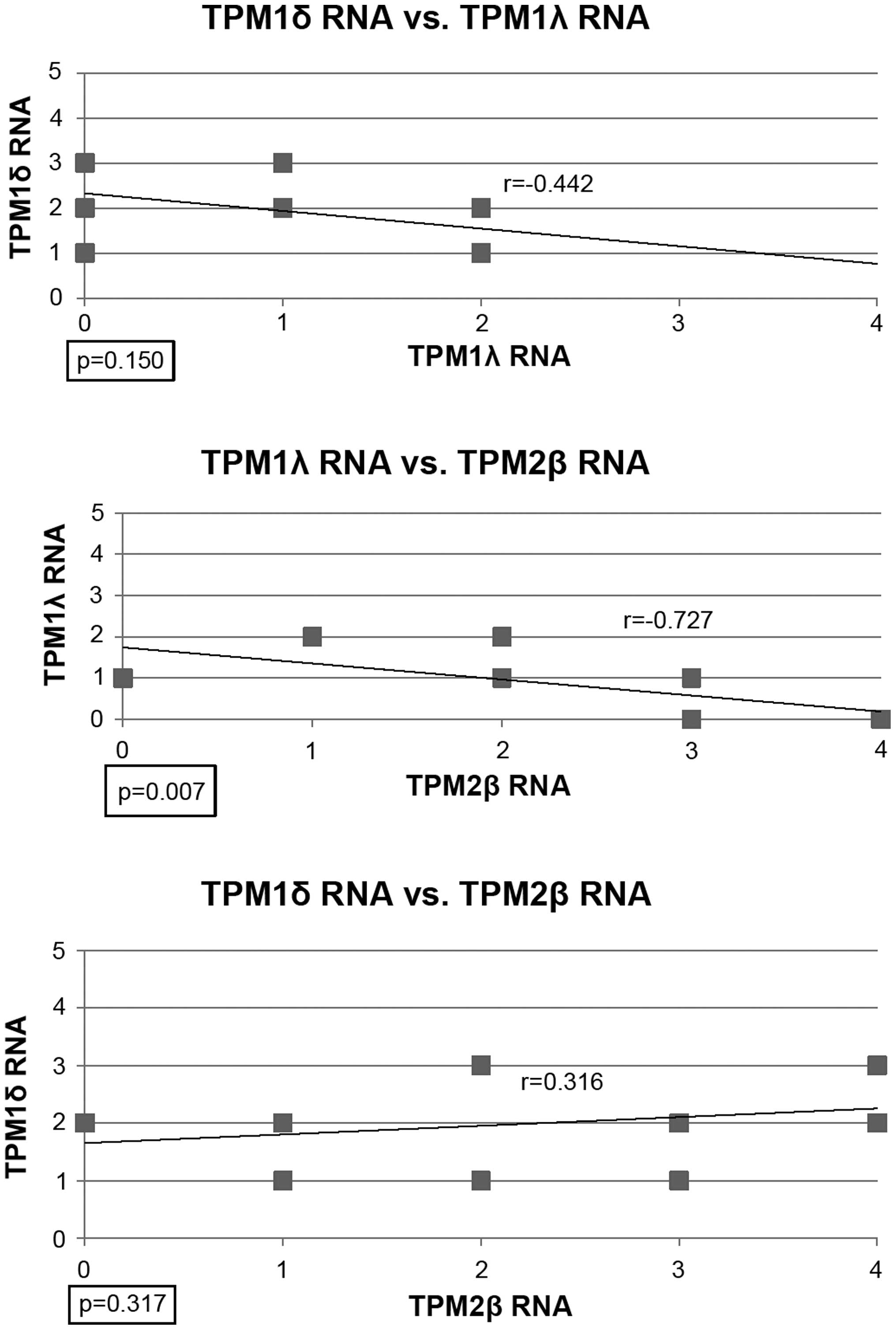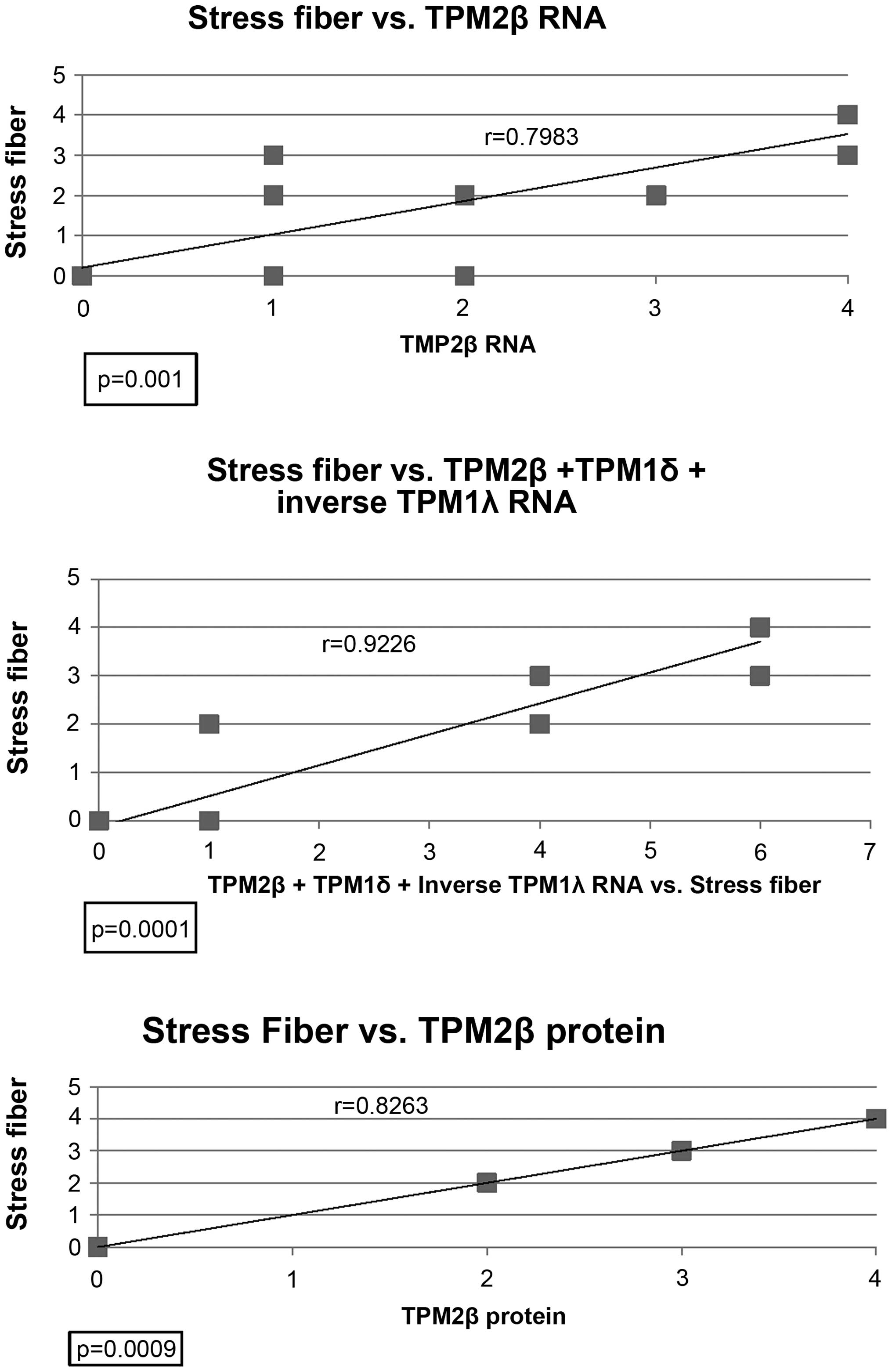|
1
|
Gunning P, O'Neill G and Hardeman E:
Tropomyosin-based regulation of the actin cytoskeleton in time and
space. Physiol Rev. 88:1–35. 2008. View Article : Google Scholar : PubMed/NCBI
|
|
2
|
Lees-Miller JP and Helfman DM: The
molecular basis for tropomyosin isoform diversity. BioEssays.
13:429–437. 1991. View Article : Google Scholar : PubMed/NCBI
|
|
3
|
Perry SV: Vertebrate tropomyosin:
Distribution, properties and function. J Muscle Res Cell Motil.
22:5–49. 2001. View Article : Google Scholar : PubMed/NCBI
|
|
4
|
Pieples K and Wieczorek DF: Tropomyosin 3
increases striated muscle isoform diversity. Biochemistry.
39:8291–8297. 2000. View Article : Google Scholar : PubMed/NCBI
|
|
5
|
Pittenger MF, Kazzaz JA and Helfman DM:
Functional properties of non-muscle tropomyosin isoforms. Curr Opin
Cell Biol. 6:96–104. 1994. View Article : Google Scholar : PubMed/NCBI
|
|
6
|
Wieczorek DF: Regulation of alternatively
spliced α-tropomyosin gene expression by nerve extract. J Biol
Chem. 263:10456–10463. 1988.PubMed/NCBI
|
|
7
|
Dube DK, McLean MD, Zajdel RW, Dube S and
Poiesz BJ: Does non-coding RNA play a critical role in sarcomeric
tropomyosin expression and subsequent myofibrillogenesis in axolotl
heart? J Clin Exp Cardiolog. 4:e1322013.
|
|
8
|
Dube DK, McLean MD, Dube S and Poiesz BJ:
Translational control of tropomyosin expression in vertebrate
hearts. Anat Rec (Hoboken). 297:1585–1595. 2014. View Article : Google Scholar
|
|
9
|
Franzén B, Linder S, Uryu K, Alaiya AA,
Hirano T, Kato H and Auer G: Expression of tropomyosin isoforms in
benign and malignant human breast lesions. Br J Cancer. 73:909–913.
1996. View Article : Google Scholar : PubMed/NCBI
|
|
10
|
Bharadwaj S and Prasad GL: Tropomyosin-1,
a novel suppressor of cellular transformation is downregulated by
promoter methylation in cancer cells. Cancer Lett. 183:205–213.
2002. View Article : Google Scholar : PubMed/NCBI
|
|
11
|
Mahadev K, Raval G, Bharadwaj S,
Willingham MC, Lange EM, Vonderhaar B, Salomon D and Prasad GL:
Suppression of the transformed phenotype of breast cancer by
tropomyosin-1. Exp Cell Res. 279:40–51. 2002. View Article : Google Scholar : PubMed/NCBI
|
|
12
|
Bharadwaj S, Hitchcock-DeGregori S,
Thorburn A and Prasad GL: N terminus is essential for tropomyosin
functions: N-terminal modification disrupts stress fiber
organization and abolishes anti-oncogenic effects of tropomyosin-1.
J Biol Chem. 279:14039–14048. 2004. View Article : Google Scholar : PubMed/NCBI
|
|
13
|
Bakin AV, Safina A, Rinehart C, Daroqui C,
Darbary H and Helfman DM: A critical role of tropomyosins in TGF-β
regulation of the actin cytoskeleton and cell motility in
epithelial cells. Mol Biol Cell. 15:4682–4694. 2004. View Article : Google Scholar : PubMed/NCBI
|
|
14
|
Zhu S, Si ML, Wu H and Mo YY: MicroRNA-21
targets the tumor suppressor gene tropomyosin 1 (TPM1). J Biol
Chem. 282:14328–14336. 2007. View Article : Google Scholar : PubMed/NCBI
|
|
15
|
Helfman DM, Flynn P, Khan P and Saeed A:
Tropomyosin as a regulator of cancer-cell transformation.
Tropomyosin. Gunning P: Springer; Berlin: pp. 124–131. 2008,
View Article : Google Scholar
|
|
16
|
Dube S, Yalamanchili S, Lachant J, Abbott
L, Benz P, Mitschow C, Dube DK and Poiesz BJ: Expression of
tropomyosin 1 gene isoforms in human breast cancer cell lines. Int
J Breast Cancer. 2015(859427)2015. View Article : Google Scholar : PubMed/NCBI
|
|
17
|
Dube S, Yalamanchili S, Lachant J, Abbott
L, Benz P, Dube DK and Poiesz BJ: Expression of tropomyosin 2 gene
isoforms in human cardiac tissue. Int J Cardiol Res.
1(301)2014.
|
|
18
|
Pinnamaneni S, Dube S, Welch C, Shrestha
R, Benz P, Abbott L, Poiesz BJ and Dube DK: Effect of Shz-1, a
cardiogenic small molecule, on expression of tropomyosin in axolotl
hearts. Am Based Res J. 2:24–40. 2013.
|
|
19
|
Thomas A, Rajan S, Thurston HL, Masineni
SN, Dube P, Bose A, Muthu V, Dube S, Wieczorek DF, Poiesz BJ, et
al: Expression of a novel tropomyosin isoform in axolotl heart and
skeletal muscle. J Cell Biochem. 110:875–881. 2010. View Article : Google Scholar : PubMed/NCBI
|
|
20
|
Denz CR, Zhang C, Jia P, Du J, Huang X,
Dube S, Thomas A, Poiesz BJ and Dube DK: Absence of mutation at the
5′-upstream promoter region of the TPM4 gene from cardiac mutant
axolotl (Ambystoma mexicanum). Cardiovasc Toxicol. 11:235–243.
2011. View Article : Google Scholar : PubMed/NCBI
|
|
21
|
Tojkander S, Gateva G and Lappalainen P:
Actin stress fibers - assembly, dynamics and biological roles. J
Cell Sci. 125:1855–1864. 2012. View Article : Google Scholar : PubMed/NCBI
|
|
22
|
Prasad GL, Fuldner RA and Cooper HL:
Expression of transduced tropomyosin 1 cDNA suppresses neoplastic
growth of cells transformed by the ras oncogene. Proc Natl Acad Sci
USA. 90:7039–7043. 1993. View Article : Google Scholar : PubMed/NCBI
|
|
23
|
Braverman RH, Cooper HL, Lee HS and Prasad
GL: Anti-oncogenic effects of tropomyosin: Isoform specificity and
importance of protein coding sequences. Oncogene. 13:537–545.
1996.PubMed/NCBI
|
|
24
|
Prasad GL, Masuelli L, Raj MH and
Harindranath N: Suppression of src-induced transformed phenotype by
expression of tropomyosin-1. Oncogene. 18:2027–2031. 1999.
View Article : Google Scholar : PubMed/NCBI
|















